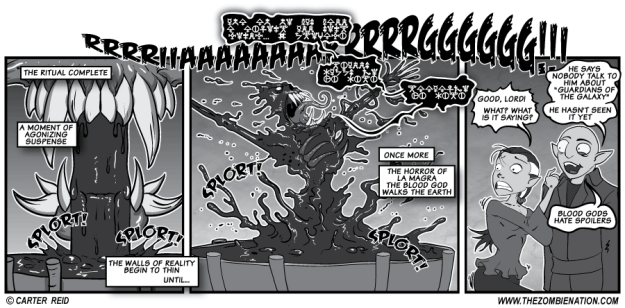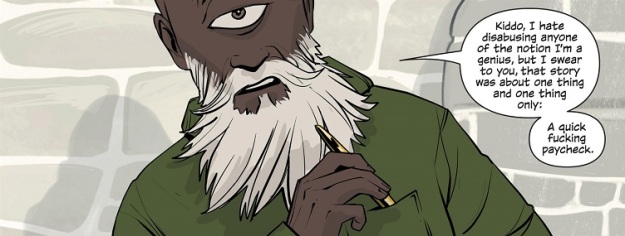Here are seven (nutty) nuggets of information that we can get out of the Hugo results and statistics:
1. The science fiction and fantasy fandom won’t take any bullshit from conservative culture warriors who want to use Hugo awards to make a political point
Not counting the movie and TV show categories, every single nominee on the two slates finished below No Award, by a significant margin. That was a surprise to me. I expected that the results would be a mixed bag, but the fandom was out in force and up in arms.
2. I’m not a puppy-kicker after all
I tried to give every nominee a chance (even though many weren’t worth it) and ended up putting few puppy picks above No Award. As I was doing it, I still considered myself some kind of an Anti-Puppy hardliner, because I’m sure my dislike for the Puppy movement and their absurd arguments does show and some pro-puppy commenters made it clear that they think I’m a nasty, wretched SJW troll. But what do you know — turns out that the majority of fans was less forgiving and I ended up being the mellow moderate.
3. We need EPH
The Hugogeddon 2015 has proven, though, that the nomination phase is easy to game. The system breaks down when there’s tactical voting, and it should be changed so that we can be sure that the results reflect the opinions of 100% of the nominating fans, not 20%. E Pluribus Hugo rule change proposal is the logical step to the right direction. The long list of great works that Brad R. Torgersen and Vox Day managed to force out makes a very good case for EPH.
4. Puppies might bite our ankles until the end of time
In the tradition of all true supervillains, Vox Day vowed to be back for blood next year. I very much doubt that he has the minionpower to do much damage without a sizeable useful idiot contingent that will be hard to put together after everybody saw how miserably Sad Puppies failed. In the age of Internet, however, trolls are a resource that will never be exhausted.
5. Puppies often lie…
It will be interesting to see how the Puppy ringleaders plan to coin the campaign next year. First, it was about the swashbuckling fun that feminists take away from wrongfans. Then, when very little fun was to be found on the slated works, the goalposts switched place and it was about getting more people to realize that they could vote. At some point, it was also about countering the evil, liberal mass media that lies about the Puppies, or evil, liberal creative directors who lie about the Puppies, or evil, liberal publishing houses that publish Puppies AND lie about them.
None of these goals requires throwing smear around like Brad Torgersen did right from the start in his screed posts, though, so the logical conclusion is that sticking it to the SJWs was mainly the point all along. I guess most Hugo voters realized this.
6. …but some Puppies are honest
Despite what many people may think, all Puppy voters didn’t follow the party line.
Take Dark Between the Stars by Kevin J. Anderson, for example. It’s very hard to come across any praise for the book by somebody who isn’t a devout puppy, I think. It was severely bashed in almost all non-Puppy reviews I read. However, the stats show that out of the 251 voters who thought that DBtS is the best book of the year, only 130 chose Jim Butcher’s Skin Game (that’s the other Puppy nominee) as their second choice. Nearly as many of them (93, to be exact) thought that Three-Body Problem, Goblin Emperor or Ancillary Sword is the second best novel of the year. I guess they voted what they felt is the right choice. Especially Goblin Emperor and Ancillary Sword were severely bashed by Puppies, in turn, but over fifty voters went that way.
Another example: in the fan writer category, fans of the staunch anti-SJW evangelist Amanda S. Green were more likely to have the staunch social justice advocate Laura J. Mixon as their second choice than fellow-Puppies Dave Freer or Jeffro Johnson. Actually, even if you combine the Green-Freer and Green-Johnson voters, they’ll still lose to the Green-Mixon crowd. Judging by the internet rhetoric, that was unexpected. And that’s a nice setup for my last point.
7. Other fans like the weirdest things
If two fans can’t get a fight started about the merits of some book or writer, they aren’t real fans at all. You can’t herd cats and you can’t herd fans.
Yes, I mostly agree with the non-Puppy voters on the Puppy nominees’ merits. The non-Puppy nominees’ merits are a different matter entirely. Three-Body Problem is good, Ms. Marvel is great and there’s a nice raccoon in Guardians of the Galaxy, sure. However, nobody in the world can convince me that they’re better than Ancillary Sword, Sex Criminals and Lego Movie. No one.
Congratulations for all the Hugo winners and losers, and condolences for everybody who just learned that they would’ve been on the ballot if the Puppies hadn’t messed it up!


